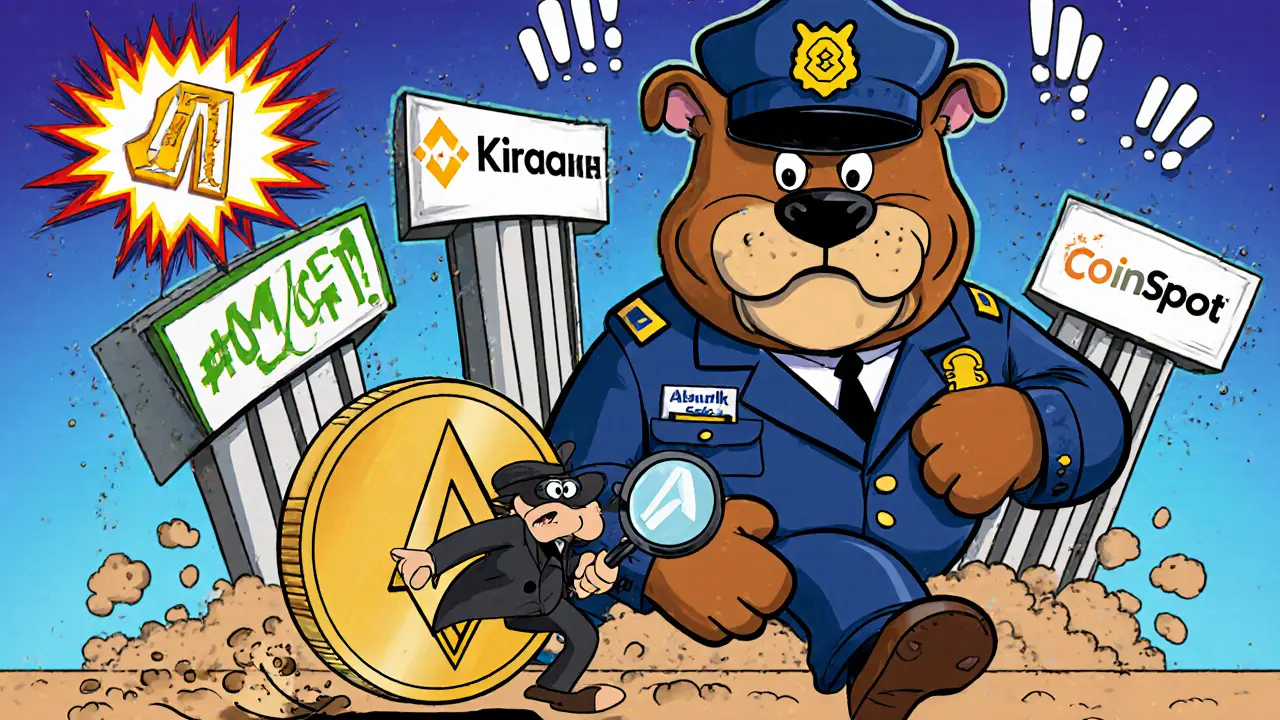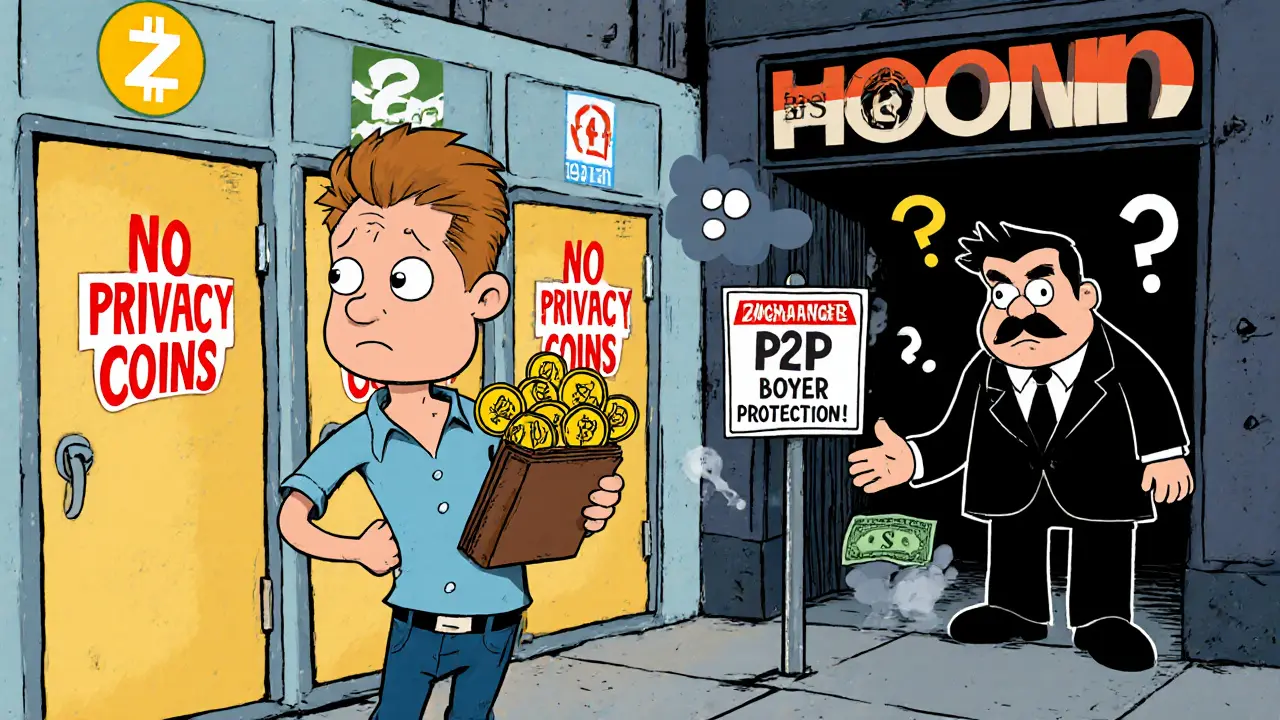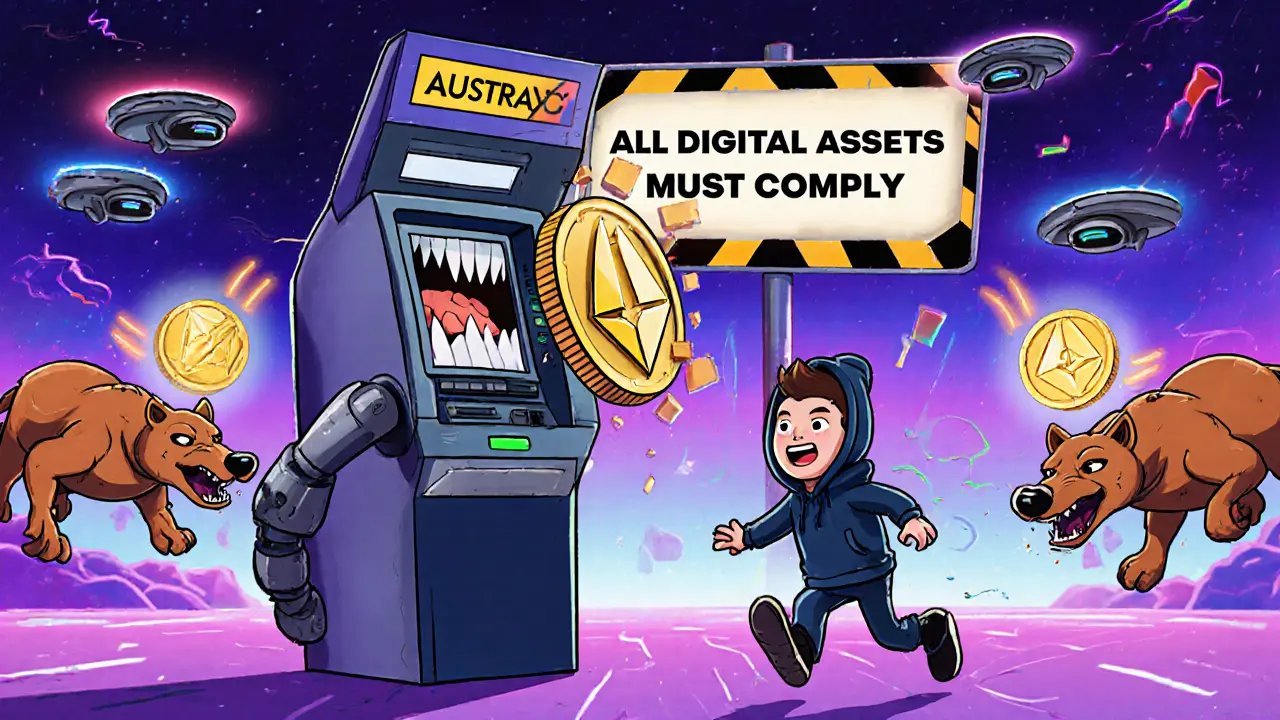Privacy Coins Ban on Australian Crypto Exchanges: What You Need to Know in 2025
 Nov, 13 2025
Nov, 13 2025
Privacy Coin Trading Accessibility Checker
Check whether you can trade privacy coins on Australian platforms and understand your options based on current regulations.
If you own Monero, Zcash, or Dash in Australia, you can still hold them - but you can’t trade them on any major crypto exchange. That’s the reality as of 2025. Privacy coins aren’t illegal to own, but the platforms where most people buy and sell crypto have been forced to remove them. It’s not a sudden crackdown. It’s the result of years of regulatory pressure, global trends, and exchanges choosing compliance over convenience.
Why Privacy Coins Got Banned on Australian Exchanges
Privacy coins are designed to hide who sent money, who received it, and how much was transferred. Monero uses ring signatures and stealth addresses. Zcash uses zero-knowledge proofs. These aren’t just buzzwords - they’re advanced cryptography that makes transactions truly untraceable. That’s great if you want financial privacy. It’s a nightmare for regulators. Australia’s financial watchdogs, ASIC and AUSTRAC, don’t ban coins outright. Instead, they make it impossible for exchanges to list them. Under the Anti-Money Laundering and Counter-Terrorism Financing Act 2006, exchanges must know their customers and track every transaction. With privacy coins, that’s not possible. No one can verify the origin of funds. No one can prove a transaction isn’t linked to drugs, ransomware, or tax evasion. In 2025, 73 global exchanges removed privacy coins - a 43% jump from 2023. Australia didn’t lead the charge, but it followed the pack. Binance pulled Monero and Zcash from its US and European platforms in February. Kraken did the same in Canada in March. Poloniex delisted Monero globally in April after pressure from the US Treasury. Australia’s exchanges didn’t need a law to act. They just needed to avoid fines.How the Rules Work in Practice
There’s a big difference between owning a privacy coin and trading it. In Australia, you can buy Monero on a peer-to-peer platform like LocalMonero. You can hold it in a non-custodial wallet. You can even send it to someone overseas. But if you try to sell it on CoinSpot, Independent Digital Assets Exchange, or any other licensed Australian exchange, you’ll hit a wall. They simply won’t let you. The reason? Compliance risk. AUSTRAC has canceled registrations of exchanges that failed to meet AML/CTF rules. In 2022, ASIC stopped Holon Investments from distributing crypto funds. It’s gone after Qoin, Block Earner, and Finder Wallet for offering unlicensed financial services. Exchanges can’t afford to risk that. One misstep could mean losing their license. Institutional investors - hedge funds, family offices, even superannuation funds dipping into crypto - overwhelmingly support the ban. IDAX reported that 78% of its institutional clients pushed for privacy coin removal. Why? Because banks and auditors won’t touch crypto platforms that deal in untraceable assets. For big money, privacy coins are a liability, not an asset.What This Means for Regular Users
For everyday Australians, the ban has real consequences. If you want to buy Zcash, you can’t use your bank account on a local exchange. You can’t link your PayPal. You can’t use a debit card. Your only option is peer-to-peer trading - and that comes with risks. P2P markets like LocalMonero saw a 19% surge in activity after exchanges dropped privacy coins. But trading with strangers online means you’re exposed to scams, chargebacks, and price manipulation. There’s no buyer protection. No dispute resolution. No insurance. One wrong move, and your money vanishes. Some users have turned to offshore exchanges. But those platforms often don’t comply with Australian consumer laws. If something goes wrong, you have no legal recourse. And if AUSTRAC expands its reach in March 2026 - as planned - even using an offshore exchange to trade privacy coins could raise red flags.
How Australia Compares to the Rest of the World
Australia isn’t the strictest. Japan banned privacy coins entirely in 2018. Dubai has a full ban. The European Union is set to outlaw them completely by July 2027. But Australia’s approach is just as effective - and more subtle. Instead of passing a law saying “no privacy coins,” Australia lets market forces do the work. Exchanges remove them to stay licensed. Users are left with limited options. It’s a quiet, bureaucratic ban - but it works. Countries like Switzerland and Liechtenstein still allow privacy coins, but only under strict KYC and AML rules. Users must prove their identity. Transactions must be monitored. That’s not how privacy coins were designed to work. If Monero or Zcash ever adopt those rules, they lose their core value. Most global exchanges - Kraken, Bittrex, Huobi - have voluntarily removed privacy coins worldwide. That means even if you live in a country that allows them, you might not be able to trade them on the platforms you use. Australia’s policy is just one piece of a global trend.What’s Next for Privacy Coins in Australia?
March 31, 2026, is the next big date. That’s when AUSTRAC’s expanded rules kick in, covering all digital asset service providers - not just exchanges. Wallet providers, crypto ATMs, even decentralized platforms that interact with Australian users could be forced to comply. That could mean even P2P platforms face pressure to collect user data. There’s no sign that regulators will soften their stance. The US Treasury has offered $625,000 to anyone who can break Monero’s privacy features. That’s not a bounty for innovation - it’s a war chest for surveillance. If the government can’t trace the coins, they’ll try to break the technology. Some developers are working on “compliant privacy” - coins that hide transaction details but still allow regulators to see them under court order. But that’s a contradiction. If a third party can unlock your privacy, it’s not privacy anymore. Most privacy advocates reject the idea outright. For now, the future of privacy coins in Australia looks bleak. They’re not banned by law - but they’re banned by practicality. The infrastructure that supports them - exchanges, banks, payment processors - has been shut down. Without access to the system, the coins become hard to use, hard to sell, and hard to trust.
Can You Still Use Privacy Coins in Australia?
Yes - but only if you’re willing to go off-grid. Here’s what you can do:- Hold privacy coins in a non-custodial wallet (like Monero GUI or Zcash Shielded Wallet).
- Buy via peer-to-peer platforms like LocalMonero or Paxful (with extreme caution).
- Send to international wallets or exchanges outside Australia.
- Trade using crypto ATMs - though many now require ID and won’t accept privacy coins.
- Trade Monero, Zcash, or Dash on CoinSpot, Swyftx, Independent Digital Assets Exchange, or any ASIC-registered platform.
- Use a bank transfer or credit card to buy privacy coins through an Australian exchange.
- Expect customer support or dispute resolution if something goes wrong.
What This Ban Says About Crypto in Australia
This isn’t just about privacy coins. It’s about control. Australia’s stance reflects a growing global belief: if you can’t see the money, you can’t regulate it. And if you can’t regulate it, you can’t stop crime - or tax evasion. For many, that’s a fair trade-off. For others, it’s a violation of financial freedom. But the reality is simple: if you want to use crypto in Australia, you’re playing by the government’s rules. Privacy coins don’t fit. And until the technology changes - or the laws do - they’ll stay off the exchanges. The question isn’t whether privacy coins will return to Australian platforms. It’s whether users will accept the trade-off: convenience and safety over true financial privacy.Are privacy coins illegal in Australia?
No, privacy coins like Monero, Zcash, and Dash are not illegal to own in Australia. You can hold them in your personal wallet. But licensed crypto exchanges are banned from listing or trading them due to AML/CTF compliance rules. The restriction applies to exchanges, not individuals.
Can I still buy Monero in Australia?
Yes, but only through peer-to-peer platforms like LocalMonero or by using international exchanges that don’t comply with Australian regulations. You can’t buy Monero directly with AUD on CoinSpot, Swyftx, or any other ASIC-registered exchange. Be aware that P2P trading carries risks like scams, chargebacks, and no buyer protection.
Why did Australian exchanges remove privacy coins?
Exchanges removed privacy coins because they can’t comply with AUSTRAC’s anti-money laundering rules. Privacy coins hide transaction details - sender, receiver, amount - making it impossible to track illegal activity. Exchanges face heavy fines or license cancellation if they fail to meet these requirements, so they chose to delist rather than risk enforcement.
Will privacy coins come back to Australian exchanges?
Not unless the technology changes. Privacy coins rely on anonymity - and AUSTRAC requires transparency. Some developers are exploring "compliant privacy" features that let regulators view transactions under court order, but that defeats the purpose. Most experts believe privacy coins won’t return to Australian exchanges unless the law changes - which isn’t expected anytime soon.
What happens on March 31, 2026?
On March 31, 2026, AUSTRAC’s expanded rules will apply to all digital asset service providers - not just exchanges. This includes wallet providers, crypto ATMs, and even decentralized platforms that interact with Australian users. It could mean even P2P platforms face pressure to collect user data, making privacy coin use even harder in Australia.
Edward Phuakwatana
November 14, 2025 AT 21:01Bro, this is the future of finance 🌐✨. Privacy isn't a bug - it's a feature. Monero's ring signatures are like whispering in a crowded room where no one knows who said what. Regulators want to turn crypto into a bank with extra steps. But if you're not free to transact privately, are you really free at all? 🤔💸
Suhail Kashmiri
November 16, 2025 AT 02:59Good. Finally someone’s doing something about these crypto trash bags. Monero? More like Monero-terror. If you’re hiding your transactions, you’re hiding something illegal. Why should I pay taxes if you’re buying drugs with untraceable cash? Grow up and play by the rules. 🚫
Kristin LeGard
November 17, 2025 AT 10:26Oh please. The US is way more chill about this. We don’t ban tech because it’s hard to spy on. Australia’s just scared of its own shadow. If you want to control money, you need to control people - and that’s fascism with a blockchain logo. 🇺🇸🔥
Arthur Coddington
November 18, 2025 AT 06:03I mean… why even care? It’s just digital money. Nobody’s gonna use Monero to buy coffee. It’s all just people pretending they’re cypherpunks while scrolling TikTok. The whole thing’s a performance. I’d rather just buy a Tesla and call it a day. 🤷♂️
Phil Bradley
November 18, 2025 AT 10:56Can we talk about how wild it is that the same people screaming about ‘financial freedom’ are also the ones who can’t even set up a cold wallet? This ban isn’t about privacy - it’s about who gets to be in the club. If you’re not on an exchange, you’re not ‘real crypto.’ And that’s the real tragedy. 💔
Stephanie Platis
November 20, 2025 AT 06:02Let’s be clear: if you’re using privacy coins to evade taxes, you’re breaking the law. And if you’re using them to avoid detection for illicit activity, you’re breaking the law - again. Australia’s regulators aren’t overreaching; they’re enforcing existing statutes that have been on the books for decades. There’s no mystery here. It’s not a ban. It’s compliance. 📜
Michelle Elizabeth
November 20, 2025 AT 13:51It’s funny how the same people who scream ‘decentralization!’ panic when they can’t trade on CoinSpot. You want freedom? Then don’t rely on gatekeepers. But most of you just want the convenience of a bank - with more volatility. The market’s filtering out the fakes. Welcome to adulthood. 🍷
Joy Whitenburg
November 21, 2025 AT 15:50Y’all are overthinking this. I just hold my XMR in my ledger, send it to my friend in Canada, and chill. No drama. No stress. If the exchange won’t let me trade? Cool. I’ll just use P2P. It’s not perfect, but it’s mine. And honestly? I kinda like that it’s a little messy. 😌
Kylie Stavinoha
November 23, 2025 AT 11:55This is a global paradigm shift - not just an Australian policy. The West is choosing transparency over anonymity, not because it’s inherently moral, but because centralized power demands it. Privacy coins are the last bastion of cryptographic sovereignty. If they fall, we lose a core pillar of digital rights. This isn’t about crime. It’s about control. 🌍⚖️
Diana Dodu
November 25, 2025 AT 00:41Let’s not pretend this is about crime. It’s about the government losing control. If you can’t track every dollar, you can’t tax it. You can’t fine it. You can’t punish it. This isn’t about safety - it’s about power. And Australia’s just the latest country to kneel to the almighty ledger. 🇦🇺💀
Raymond Day
November 26, 2025 AT 03:32They’re coming for your crypto next. Mark my words. First privacy coins. Then DeFi. Then NFTs. Then your Dogecoin savings. The state doesn’t want you to have untrackable wealth. They want you to be dependent. And guess what? They’re winning. 😭💸
Noriko Yashiro
November 26, 2025 AT 05:11Actually, I think this is kind of brilliant - it’s a quiet revolution. No flashy law, no protest, no drama. Just market forces doing the heavy lifting. Exchanges chose compliance. Users chose autonomy. And now we’re seeing the real divide: those who want permission… and those who don’t. 🌱
Atheeth Akash
November 28, 2025 AT 02:04Respectfully, I think this is a necessary step. Privacy is good, but not when it enables harm. I’ve seen too many friends lose money to scams on P2P. Better safe than sorry. Let the tech evolve, but don’t let it hurt people. 🙏
James Ragin
November 28, 2025 AT 07:29They’re lying. The real reason? The Fed and Treasury know privacy coins could destabilize the dollar’s dominance. Monero doesn’t need SWIFT. It doesn’t need banks. It doesn’t need permission. And if everyone used it? The entire global financial system collapses. This isn’t about AML - it’s about regime survival. The $625k bounty? That’s not a reward. It’s a declaration of war. 🕵️♂️💣